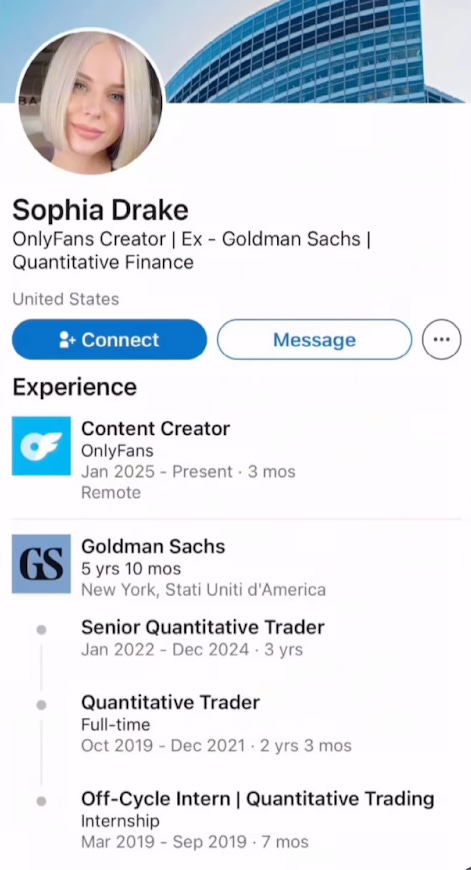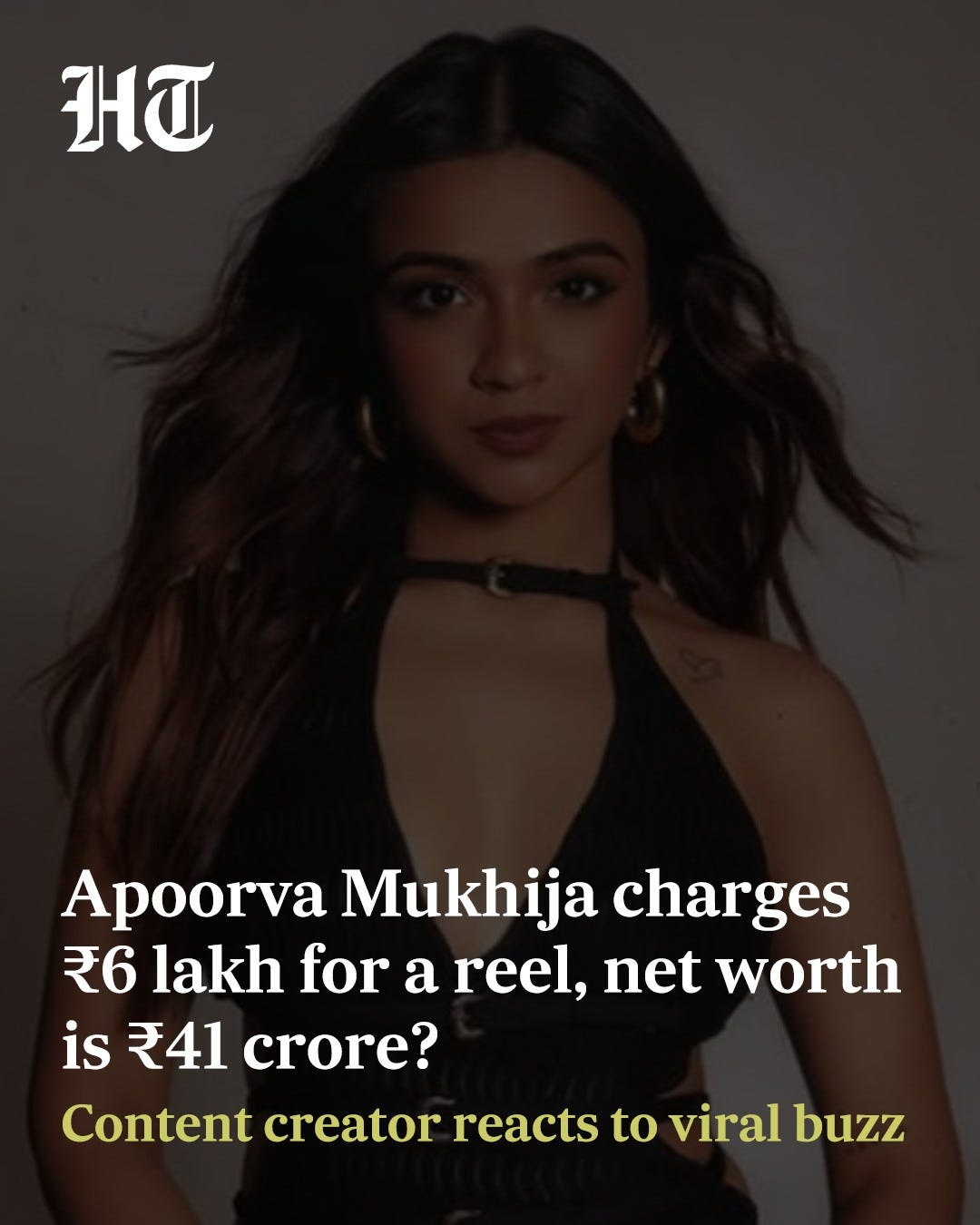This essay as an opinion piece has been published on NDTV.
In a world where a Goldman Sachs employee trades spreadsheets for lingerie and opens an OnlyFans account (not sure if the below image is real or AI-generated), one can’t help but wonder: Is traditional education losing its relevance? Or do people just want easy money? What’s with this “I am done with corporate” arc?
Maybe these moves — the shifts to content creation, the mass resignations, the pivot to passion projects, etc. are protests against a corporate culture that sold us stability but delivered burnout, that promised purpose but handed out PowerPoint decks. Maybe this isn’t an exodus…after all!
Two of my connections, after watching this, legit said if they should try OnlyFans. And that’s what prompted me to write this essay.
The Creator Economy is everything, everywhere, all at once. What used to be an “alternate route” has now become a superhighway paved with brand deals, viral content, and digital fame.
As the saying goes, money makes the man and the mare go. But in 2025, money also makes opinions louder, makes mediocrity trend, and makes sincerity seem suspicious.
I remember putting up an Instagram poll 3 weeks ago: "If you had to change your profession, what would you pick?" The strangest response was prostitution. Itna bhi sach nahi bolna tha.
Jiofication has brought 4G to every corner of India and with it, an explosion of digital content. Village folks with zero exposure to editing software are now producing reel-worthy melodrama. Dolly Chaiwala is serving tea like he's at Coachella. There are pre-teens filming thirst traps in school uniforms.
Instagram has become a bizarre marketplace of half-naked ambition, emotional trauma dressed as engagement, and sometimes, just plain vulgarity. The algorithm doesn’t care if your reel is funny, fake, or feral. It simply, simply wants your audience to stop scrolling. Ugh!
The rise of the creator economy has subtly brutalised the psyche of the toppers, the achievers, the ones who did everything right. They followed the rules, got the degrees, ticked the checkboxes, and yet now find themselves sidelined by viral dancers, meme-page moguls, and ex-accountants-turned-influencers selling gut health gummies. Their skills of analytical thinking, discipline, and research feel undervalued in a world where charisma and content outperform competence. The result is a quiet, rising tide of impostor syndrome, burnout, and identity crisis.
I’m not saying content creation is easy. Far from it. In fact, it’s one of the most emotionally taxing, high-pressure, and unstable careers out there, where your self-worth gets tied to algorithms, and one bad week of engagement feels like professional failure.
You’re constantly performing, optimising, and adapting, and yet, there are no real metrics for fulfilment. You're your own boss, sure, but also your own HR, marketing team, editor, copywriter, legal counsel, and punching bag. It demands creativity on tap and vulnerability in bulk, often without boundaries. So no, it’s not easy. But what’s frustrating is how the world glamorises it without nuance and devalues everything else in the process.
So, do we still need an education to succeed?
The new economy says, “umm, not really”.
The old narrative was: go to school, get a degree, get a job, climb the ladder, retire. The new one looks more like: dropout or barely graduate, learn editing on YouTube, build a following, monetise attention, work from anywhere, buy a drone.
Journo Ria Chopra’s take on Reelization:
My friends are struggling to get jobs. The recession is here and real. One viral reel can earn you more than a master’s degree. A meme page can get you brand sponsorships. A Twitter thread can land you a TED Talk. A podcast with a ring light can get you invited to Parliament panels.
Is it fair? Maybe not. Mostly not. But it’s very real.
Let’s talk numbers. The global creator economy is projected to be worth over 480 billion dollars by 2027. India alone has over 80 million creators. One in four Gen Z individuals says they want to be influencers when they grow up. Yet only about five per cent of creators earn above fifty thousand rupees a month.
So what’s everyone else doing?
They’re hustling. Posting twice a day. Selling affiliate links. Copying trending audio. Designing carousels about “10 things I learned in therapy” while suppressing their breakdowns. Because in the creator world, everyone’s trying to get rich off attention.
Meanwhile, the conversation around education remains painfully outdated. I was so furious when I heard about Grammarly being used by ICSE/IB schools.
So, what are we teaching children today? Quadratic equations in a world ruled by Instagram algorithms? Are we still asking them to memorise photosynthesis when AI can generate poems, pitches, and pictures of dinosaurs drinking boba tea?
Gen Z doesn’t want to work. Or rather, they don’t want to work in ways their parents did. And Gen Alpha… Well, what they’re learning today might be obsolete by next summer.
They want flexibility. They want purpose. They want attention. They want passive income. And yes, they want mental health days that don’t feel like sick leaves with guilt sprinkles on top.
Even my house help is trying to create content. She asked me, “Madam, aap Nagpur se ho na? Dolly Chaiwala ka kya secret hai?” She doesn’t fully understand what Dolly is selling. Neither do I. But she knows there's money in clout. Her cousin wants to start a YouTube channel. She asked if a ring light was available on Blinkit.
This is the new aspiration.
Apoorva Mukhija (aka the rebel kid), a Gen Z content creator, reportedly earned forty-one crores last year. Somewhere, a software engineer with an MBA from IIM is debugging a slide deck and rethinking his life.
So, what is the future of learning then?
If AI can write essays, Canva can design resumes, and 129783+ apps can teach you to edit videos, what exactly are we preparing children for? Are we training them to compete with machines or to collaborate with them? Are we teaching them how to think, how to be kind, how to build something without losing themselves to the dopamine loop of likes?
I have too many nephews and nieces to worry about. Their schools are introducing "bad touch" awareness at age three. I’ve worked on a comprehensive campaign on the infodemic. Because that’s where we are heading!
Education isn’t dead. But it’s hanging by a thread.
We must teach kids how to understand emotional intelligence, how to navigate digital ethics, how to practice financial literacy, how to identify media manipulation, and how to create with conscience. And most importantly, we must teach them how to build offline self-worth in an online-first world.
Until then, influencers will keep influencing, and teachers will keep wondering why no one’s paying attention.
When the dopamine dries up and virality moves on to the next absurd thing, we’ll need to be prepared. Not everyone can go viral. But everyone deserves the tools to build a life that doesn’t collapse when the WiFi does. :)
Class dismissed!
Writeously yours,











We are living through a turbulent yet transformative period, one not unlike previous shifts from traditional economic systems to new-age, knowledge-driven economies. Such transitions often spark uncertainty, especially in how younger generations approach education and career paths.
In this changing landscape, the responsibility to guide and inspire the next generation must be shared collectively by the community, parents, and government. It’s crucial to re-emphasize the role of education not merely as a path to employment, but as a foundation for innovation and problem-solving in the real world. Only then we can continue nurturing students who are not only academically strong but also deeply passionate about their chosen fields.
What stands out in this evolving trend is the growing autonomy of millennials and Gen Z. Unlike earlier generations, they are less inclined to pursue a field just because it is popular or parent-approved. Instead, they are increasingly driven by personal interest, purpose, and alignment with their values, a shift which in many ways, is both refreshing and hopeful.